Wed Apr 01 2020 · 9 min read
Artsakh Presidential Race Goes to Second Round in Historically Competitive Election

By Harout Manougian
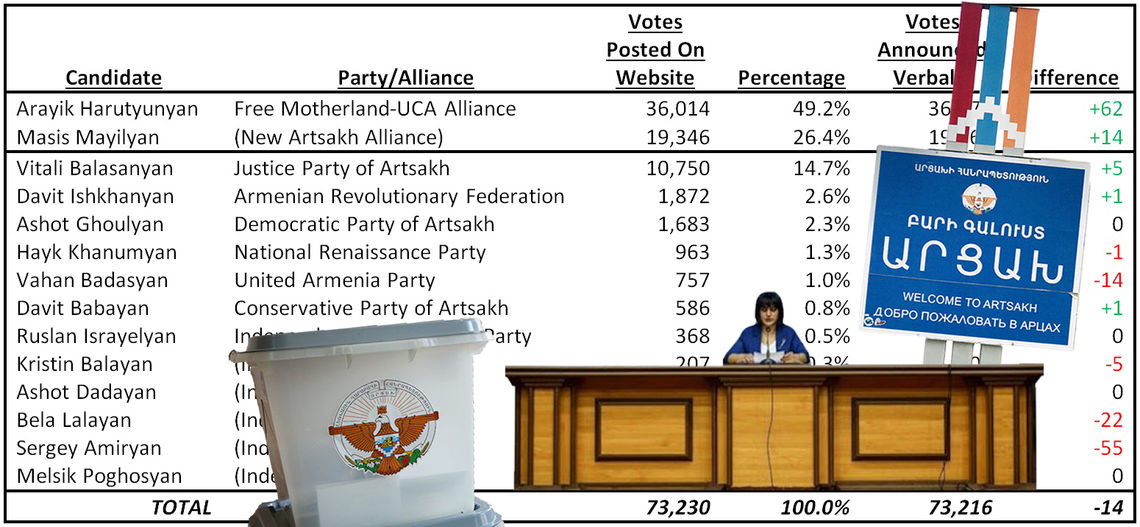
Voters from across the Republic of Artsakh went to the polls in droves on March 31 to make sure their voice was heard in an election that marked many firsts.
-
It was the first election under the framework of the 2017 Constitution and an Electoral Code revamped in 2019.
-
For the first time, elections for President and the 33-seat National Assembly took place on the same day.
-
For the first time, all of the parliamentary seats would be distributed proportionally to parties, based on their total vote share, eliminating the electoral districts used previously.
-
For the first time, a televised (and livestreamed) presidential debate took place.
-
It was the first election to take place in Artsakh amid a global pandemic. Voters and poll workers were given masks, gloves and their own pens to mitigate contagion risks.
-
A historic number of presidential candidates and political parties were on the ballot. There were 14 presidential candidates (previous record was 5 in 2007) and 12 political parties (previous record was 7 in 2015).
Perhaps most importantly, it was the first time that no presidential candidate received the required majority of votes in the first round, necessitating a runoff election to take place in two weeks.
In the past, presidential elections in Artsakh had been quite decisive, with the winner near striking distance of 90% support. In 2012, Bako Sahakyan’s re-election campaign saw his support reduced to two thirds. The detailed results of past presidential elections are shown below:

The 2020 race was very close to being a single-round victory for frontrunner Arayik Harutyunyan, who held the post of Prime Minister until 2017. (He has the same name as Armenia’s Minister of Education, Science, Culture and Sport but the two are not related to each other.) However, when the numbers rolled in from the last of the 282 polling stations, he held only 49.2% of the valid votes cast. He will face Masis Mayilyan, the current Foreign Affairs Minister, in the runoff. The full presidential race results are shown below:
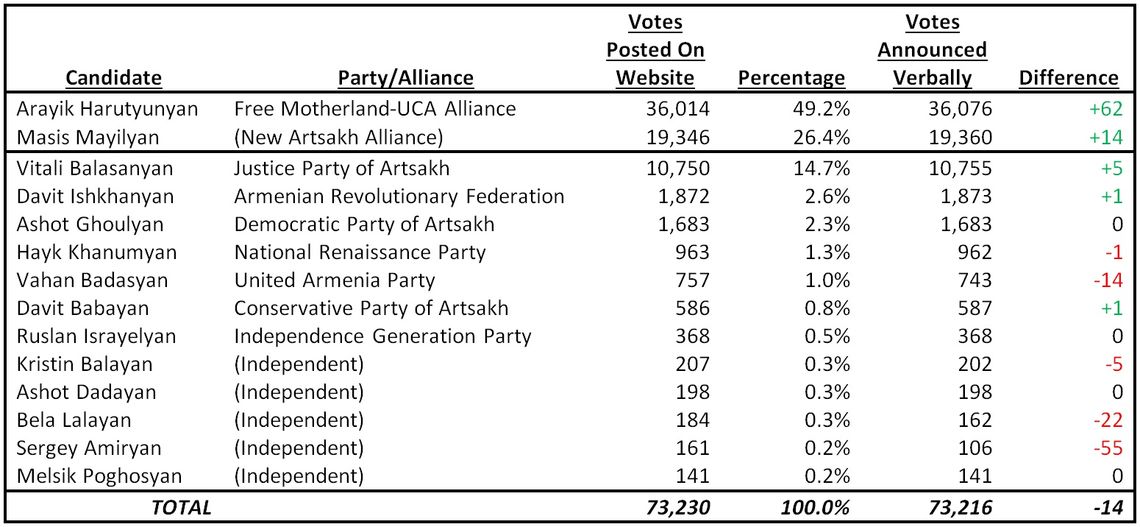
You will notice that there are two preliminary vote totals. The first represents the totals of the poll-by-poll results, as posted on the official Central Electoral Commission (CEC) website. The second set are the numbers read out verbally by CEC Chair Srbuhi Arzumanyan at the post-election press conference on April 1. The minor discrepancies between the two do not affect the final result or even the percentage distributions. The vote tallies are still considered preliminary and are subject to corrections by the CEC until the final results are published on April 7.
According to the Electoral Code, if no presidential candidate receives an outright majority of the votes cast (50% + 1 vote), the top two candidates would participate in a runoff round election 14 days later, which would be April 14. The (extremely short) official campaign period for the runoff round would start on April 11, which happens to be the day before Easter Sunday.
Easter is not the only challenge the runoff election will face. There were already calls to postpone the March 31 first round due to the global COVID-19 pandemic. Currently, there are still zero confirmed cases in Artsakh but there were fears that observers and journalists from Armenia and abroad could potentially spread the illness to Artsakh’s citizens. The Armenia-Artsakh border has been temporarily closed to non-essential travel since March 26 but election observers and journalists were granted an exception. All observers needed to first take a COVID-19 test in Armenia to confirm they were not carrying the virus before they could cross the border. At this time, it is still not clear how the pandemic will impact the second round.
As mentioned, voters filled out two (differently-colored) pieces of paper and put them into two separate ballot boxes as they voted for a new parliament at the same time as the presidential race. Under the new rules for the parliamentary component of the election, voters choose only a political party. Each party submitted a list of their candidates ahead of the election and will be granted seats in proportion to their vote share. See our previous article for more details on Artsakh’s electoral system and political parties. In order to qualify for any seats, a political party would need to first meet a 5% threshold. If parties contest together under an alliance (bloc), that threshold increases to 7%. The full parliamentary race results are shown below:
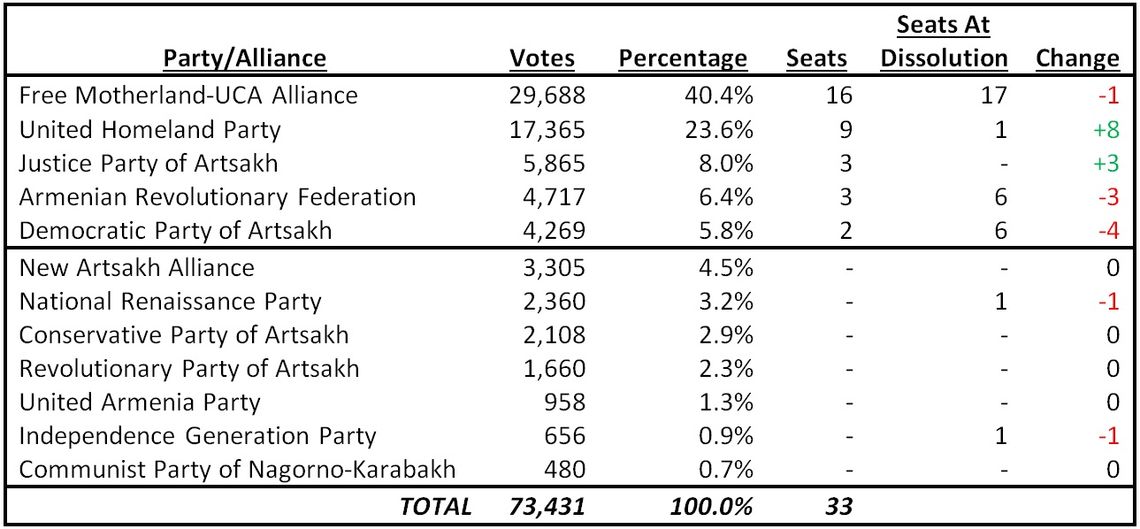
At dissolution, the Movement 88 Party held three of the 33 seats in the National Assembly. Of those three, in yesterday’s 2020 election, one ran under the Free Motherland-UCA Alliance, one ran under the United Homeland Party, and one did not run again. The table above groups them with their new political teams. The Movement 88 Party will no longer have its own caucus in parliament.
The one seat held by the Independence Generation Party belonged to Ruslan Israyelyan. He had been elected off the Free Motherland party list in the 2010 and 2015 elections but left the party in 2018 to sit as an independent.
The Democratic Party of Artsakh and the Armenian Revolutionary Federation had the size of their caucuses greatly reduced. They have been represented in the Artsakh parliament consistently throughout the 2000s and generally supported non-partisan President Bako Sahakyan’s administration, along with the Free Motherland Party.
The big winner on the parliamentary side isn’t actually eligible for a seat himself. Samvel Babayan started the United Homeland Party and originally declared his intention to run for President. However, he was not eligible to register as a presidential candidate, or even to be included on his own party’s parliamentary candidate list because he did not meet the minimum residency requirements (last ten years for president, last five years for parliament), having just recently moved back to Artsakh after time spent living in Russia and Armenia. Babayan, along with Justice Party presidential candidate Vitali Balasanyan, is a decorated war hero, having earned the highest national honor of Hero of Artsakh. In 2000, he was sentenced to prison for an assassination attempt against then-President Arkadi Ghukasyan. He was released early and left for Russia. In 2017, he was sentenced for money laundering and illegal arms possession in Armenia but was released early again after the Velvet Revolution.
Babayan had endorsed Masis Mayilyan for President. Though Mayilyan was officially nominated as an independent, he campaigned together with the New Artsakh Alliance, neither playing up nor disavowing Babayan’s endorsement.
Babayan’s United Homeland party will actually have the most gender-balanced caucus. Four of its top nine candidates, who can be presumed to become MPs, are women.
As no party will hold a majority of the 33 seats in the National Assembly, it is likely that a governing coalition will be formed. The Free Motherland-UCA Alliance would only need to convince one of the other caucuses to join them. Conversely, it is technically possible (though highly unlikely) that all four smaller parties combine their 17 seats to form a majority themselves. Again, it should be noted that the seat allocations in the table above are still preliminary and are subject to corrections before April 7.
International Reaction
Twelve MPs from Armenia, representing all three parliamentary parties, visited polling stations on Election Day as observers. Armenia’s CEC had provided assistance to Artsakh’s CEC in the form of lending ballot boxes and general advisory support. New polling booth screens were also rolled out as Artsakh’s September 2019 municipal election showed that the previously-used screens could allow part of a ballot to fall through a crack in the back. Though generally satisfied, the MPs did note reports of voters taking pictures of their ballots.
The photo-taking was seen as a serious symptom of a wider problem by the two civil society organizations conducting observation missions funded by the Armenian government. Transparency International Anticorruption Center (TIAC) and the Union of Informed Citizens (UIC) NGO believed that most voters who decided to take pictures of their ballot did so in order to prove their loyalty to a campaign, infringing on their own right and duty to keep their ballot secret. The fact that reports of this type of behaviour were widespread throughout the de facto republic suggested to them that it was likely there was an organized quid-pro-quo arrangement with voters, where they might have received a “vote bribe” in return for their support. That arrangement could have been in the form of a cash payment or more subtle non-monetary assistance provided by charities.
Ahead of the election, the UIC had urged decision-makers to make it a criminal offense for a voter to photograph their own ballot but that amendment never came. Vote bribery is illegal if it can be proved but simply taking a picture of the ballot is not sufficient evidence.
TIAC published their preliminary observation report where they noted instances of party representatives standing outside a polling place urging voters to support them. It is an infraction to do so within 50 meters of the polling place. Another systemic issue was that many voters came out of the polling booth before folding their ballot. In one specific precinct (4/2) in the Martakert region, which was being livestreamed, there was a report that ineligible ballots were being stuffed into the ballot box. All disputes will be followed up through legal channels.
The Co-Chairs of the OSCE Minsk Group, which oversees peace negotiations over the Nagorno-Karabakh conflict issued the following statement:
The OSCE Minsk Group Co-Chairs (Igor Popov of the Russian Federation, Stéphane Visconti of France, and Andrew Schofer of the United States of America) have taken note of the so-called “general elections” in Nagorno-Karabakh, the first round of which took place on 31 March.
In the context of a comprehensive settlement of the Nagorno-Karabakh conflict, the Co-Chairs recognize the role of the population of Nagorno-Karabakh in deciding its future in accordance with the principles and elements reiterated in the Co-Chairs’ statement of 9 March 2019.[1] The Co-Chairs note, however, that Nagorno-Karabakh is not recognized as an independent and sovereign state by any of the Co-Chair countries or any other country.
Accordingly, the Co-Chairs do not accept the results of these “elections” as affecting the legal status of Nagorno-Karabakh and stress that the results in no way prejudge the final status of Nagorno-Karabakh or the outcome of the ongoing negotiations to bring a lasting and peaceful settlement to the Nagorno-Karabakh conflict.
A spokesperson for the European Union released a separate statement that read:
In view of the so-called 'presidential and parliamentary elections' in Nagorno-Karabakh on 31 March 2020, the European Union reiterates that it does not recognise the constitutional and legal framework within which they are being held. This event cannot prejudice the determination of the future status of Nagorno-Karabakh or the outcome of the ongoing negotiation process.
The EU recalls its firm support to the OSCE Minsk Group and, in particular, to its Co-Chairs’ efforts to bring about progress beyond the status quo and substantive negotiations towards comprehensive and sustainable peace. The EU stands ready to further support efforts, aimed at early, peaceful resolution of the Nagorno-Karabakh conflict.
While Artsakh is not internationally-recognized, the use of the “so-called” qualifier and scare quotes struck a nerve for ethnic Armenians, whether they live in Artsakh, Armenia or the Diaspora. It represented the exact type of sanitized language that has been used and continues to be used by deniers of the Armenian Genocide.
In response to the OSCE Minsk Group’s statement, the Armenian National Committee of America, headquartered in Washington, DC, tweeted:
The @OSCE Minsk Group - "conflict mediators" - regularly dismiss the validity of #Artsakh's very robust democracy, but never - ever - criticize the #Aliyev dictatorship - a heredity petro-monarchy that has ruled over #Azerbaijan for nearly all of the past half century.
The day before the election, on March 30, Azerbaijani forces had attacked Armenia’s northeastern Tavush region, wounding two servicemen and a child.
To learn more about the Nagorno-Karabakh conflict, read our Spotlight Karabakh piece.
----------------------------------------------------------
1- The March 9 statement referred to was not available on the OSCE website.
also read
President Bako Sahakyan Dismisses Calls to Postpone Artsakh Election
By Harout Manougian
Voters will be given masks, hand sanitizer and their own pen as the vote looks set to go ahead on March 31 as originally planned.
Artsakh’s 2020 Election: The Essential Primer
By Harout Manougian , Lusine Sargsyan
Artsakh voters will be heading to the polls on March 31. Incumbent President Bako Sahakyan is not seeking another term. Meet the political candidates vying for support and the political backdrop under which they are campaigning.

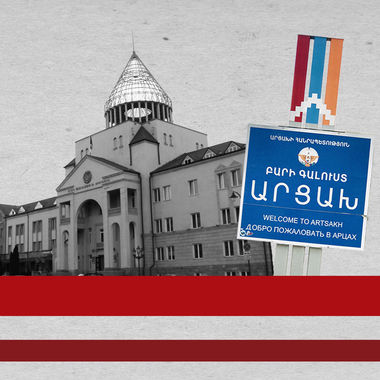
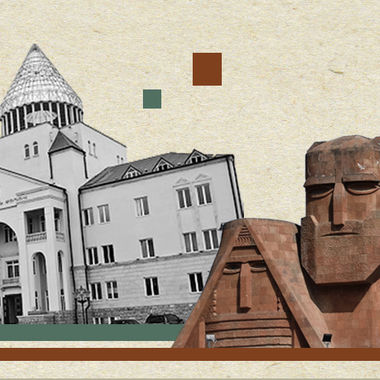


EVN Report welcomes comments that contribute to a healthy discussion and spur an informed debate. All comments will be moderated, thereby any post that includes hate speech, profanity or personal attacks will not be published.